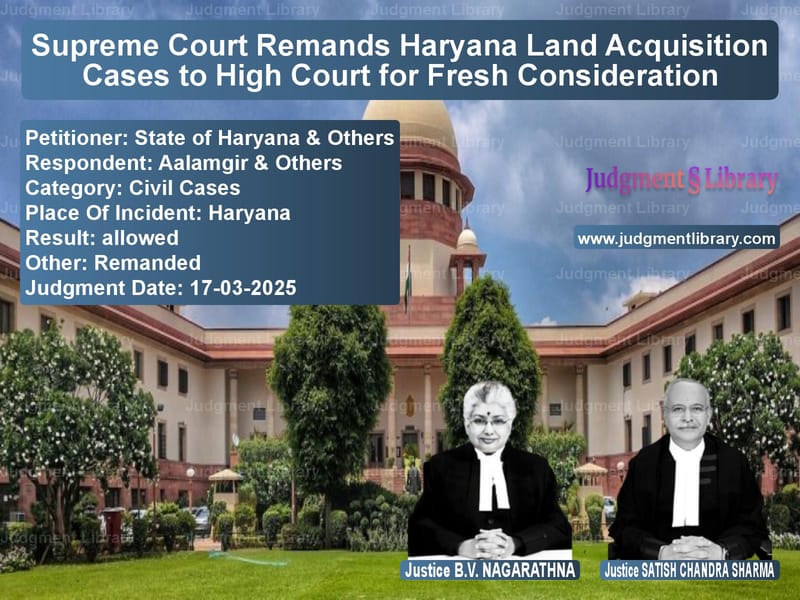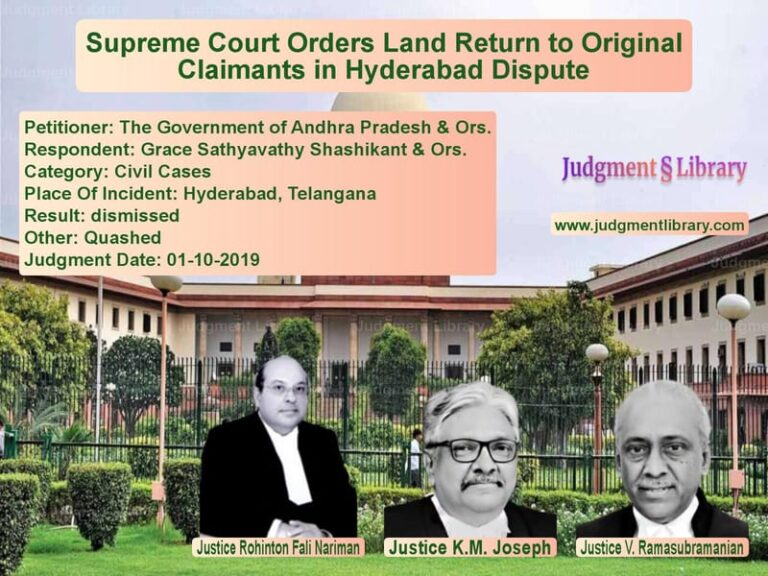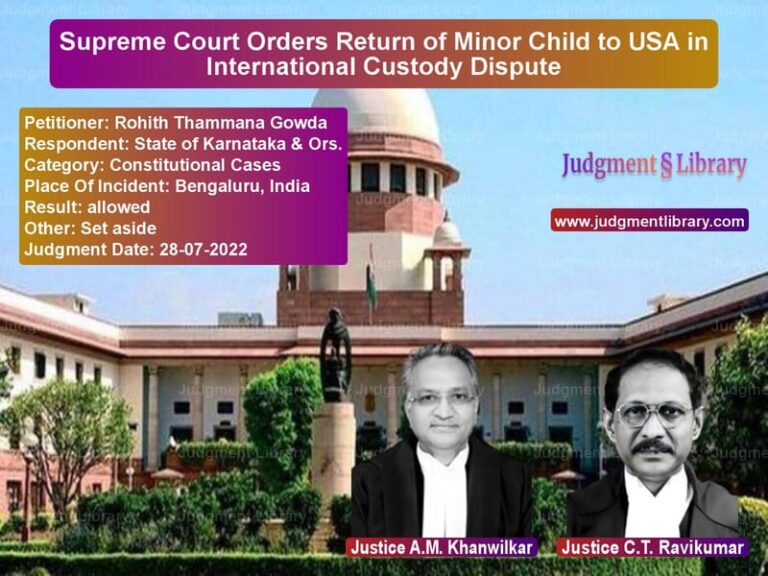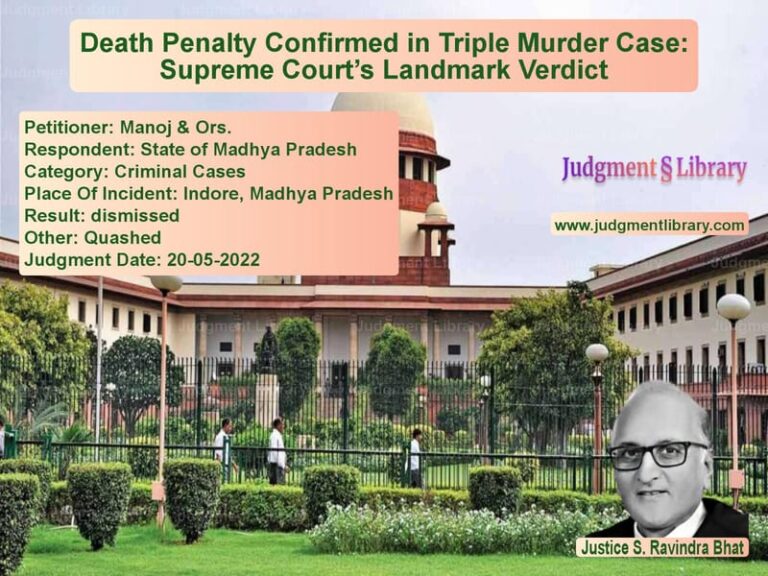Supreme Court Remands Haryana Land Acquisition Cases to High Court for Fresh Consideration
In a significant judgment delivered on March 18, 2025, the Supreme Court of India remanded multiple land acquisition cases from Haryana back to the Punjab and Haryana High Court for fresh consideration. The cases involved challenges to land acquisitions conducted under the Land Acquisition Act, 1894, with landowners seeking relief under Section 24(2) of the Right to Fair Compensation and Transparency in Land Acquisition, Rehabilitation and Resettlement Act, 2013. The Supreme Court’s decision came after noting that the High Court had relied on the since-overruled Pune Municipal Corporation judgment, while the law had subsequently been clarified by a Constitution Bench in Indore Development Authority case.
Background of the Case
The appeals before the Supreme Court arose from multiple writ petitions filed by landowners challenging land acquisition proceedings in Haryana. The High Court had allowed many of these petitions based on the interpretation of Section 24(2) of the 2013 Act as laid down in Pune Municipal Corporation v. Harakchand Misirimal Solanki (2014). However, this interpretation was subsequently overruled by a five-judge Constitution Bench in Indore Development Authority v. Manoharlal (2020).
The key legal question revolved around when land acquisition proceedings would be deemed to have lapsed under Section 24(2) of the 2013 Act. The Pune Municipal Corporation case had held that proceedings would lapse if either compensation wasn’t paid or possession wasn’t taken for five years prior to the 2013 Act coming into force. However, the Constitution Bench in Indore Development Authority held that both conditions must be satisfied – neither compensation paid nor possession taken – for proceedings to lapse.
Key Arguments Before the Supreme Court
State’s Contentions
The State of Haryana, represented by the Solicitor General, argued:
- The High Court decisions were based on the overruled Pune Municipal Corporation judgment
- The correct legal position as per Indore Development Authority needed to be applied
- Each case required factual examination of whether both conditions for lapse were met
Landowners’ Contentions
The landowners, through their counsel, submitted:
- Status quo orders should continue during remand proceedings
- They should be allowed to raise all contentions regarding validity of acquisition
- Equitable considerations should apply given passage of time and potential third-party rights
- Any concessions made by the State before High Court should be honored
Supreme Court’s Analysis
Justices B.V. Nagarathna and Satish Chandra Sharma noted:
1. Change in Legal Position
The Court emphasized the significance of the Constitution Bench decision:
“The decision rendered in Pune Municipal Corpn. is hereby overruled and all other decisions in which Pune Municipal Corpn. has been followed, are also overruled.”
2. Need for Factual Determination
The Court observed that each case required examination of specific facts:
“The determination of the factual aspects in each of these cases would inevitably call for the consideration of the original records and hearing of the arguments by the respective parties on the factual aspects of each of these cases.”
3. Practical Considerations
The Court addressed several practical concerns:
- Continued status quo during remand proceedings
- Opportunity to raise all contentions regarding validity of acquisition
- Consideration of equitable factors due to passage of time
- Treatment of cases where State had made concessions
Court’s Decision
The Supreme Court:
- Set aside the High Court orders based on Pune Municipal Corporation
- Remanded all cases back to High Court for fresh consideration
- Directed High Court to apply Indore Development Authority principles
- Maintained status quo in cases where it was previously granted
- Allowed parties to raise all contentions regarding validity of acquisition
- Permitted consideration of equitable factors due to passage of time
- Set timeline for next hearing (May 5, 2025)
Key Legal Principles Reiterated
The Court highlighted these principles from Indore Development Authority:
- Proceedings lapse only if neither compensation paid nor possession taken for five years
- Deposit in court doesn’t constitute ‘payment’ under Section 24(2)
- Tendering compensation completes obligation even if refused by landowner
- Section 24 doesn’t revive time-barred claims or reopen concluded proceedings
Conclusion
This judgment demonstrates the Supreme Court’s commitment to ensuring lower courts apply the correct legal principles, especially when earlier precedents have been overruled. By remanding the cases while protecting the interests of all parties, the Court has balanced legal correctness with practical realities. The High Court will now need to examine each case afresh, applying the stricter standards laid down in Indore Development Authority, while also considering any equitable factors that may have emerged over the long pendency of these disputes.
Petitioner Name: State of Haryana & Others.Respondent Name: Aalamgir & Others.Judgment By: Justice B.V. NAGARATHNA, Justice SATISH CHANDRA SHARMA.Place Of Incident: Haryana.Judgment Date: 17-03-2025.
Don’t miss out on the full details! Download the complete judgment in PDF format below and gain valuable insights instantly!
Download Judgment: state-of-haryana-&-o-vs-aalamgir-&-others-supreme-court-of-india-judgment-dated-17-03-2025.pdf
Directly Download Judgment: Directly download this Judgment
See all petitions in Property Disputes
See all petitions in Damages and Compensation
See all petitions in Consumer Rights
See all petitions in Landlord-Tenant Disputes
See all petitions in Specific Performance
See all petitions in Judgment by B.V. Nagarathna
See all petitions in Judgment by Satish Chandra Sharma
See all petitions in allowed
See all petitions in Remanded
See all petitions in supreme court of India judgments March 2025
See all petitions in 2025 judgments
See all posts in Civil Cases Category
See all allowed petitions in Civil Cases Category
See all Dismissed petitions in Civil Cases Category
See all partially allowed petitions in Civil Cases Category







